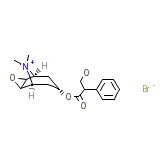Scop




Scop Brand names, Scop Analogs
- Ampyrox
- Blocan
- Diopal
- Epoxymethamine Bromide
- Epoxytropine Tropate Methylbromide
- Holopon
- Hyoscine Methobromide
- Hyoscine Methylbromide
- Lescopine Bromide
- Mescopil
- Methscopolamine
- Methoscopylamine Bromide
- Methscopolamine Methylbromide
- Methylscopolamine Bromide
- Methylscopolamine Hydrobromide
- N-Methylhyoscine Bromide
- N-Methylscopolamine Methylsulfate
- N-Methylscopolammonium Bromide
- Neo-Avagal
- Nutrop
- Pamine
- Pamine bromide
- Paraspan
- Proscomide
- Restropin
- Scopolammonium, N-methylbromide
- Scopolamin Methylbromide
- Scopolamine Methobromide
- Scopolamine Methylbromide
- Transderm Scop
Scop Brand Names Mixture
- Biosol-M-Aquadrops liq (methscopolamine bromide + neomycin sulfate)
- Neomix-pamine Scour Bolus (methscopolamine bromide + neomycin sulfate)
- Neomix-pamine Solution (methscopolamine bromide + neomycin sulfate)
- Neosol M Aquadrops (methscopolamine bromide + neomycin)
- Scour solution (methscopolamine bromide + neomycin)
- Scour solution coop (methscopolamine bromide + neomycin)
Scop Chemical_Formula
C18H24NO4.Br
Scop RX_link
http://www.rxlist.com/cgi/pharmclips2.cgi?keyword=%20Methscopolamine
Scop fda sheet
Scop msds (material safety sheet)
Scop Synthesis Reference
No information avaliable
Scop Molecular Weight
397.089 g/mol
Scop Melting Point
225 oC
Scop H2O Solubility
Freely soluble
Scop State
Solid
Scop LogP
-2.58
Scop Dosage Forms
Tablet (2.5mg, 5mg)
Scop Indication
Used as adjunctive therapy for the treatment of peptic ulcer. Also used to treat nausea and vomiting due to motion sickness.
Scop Pharmacology
Methscopolamine bromide is a muscarinic antagonist structurally similar to the neurotransmitter acetylcholine and acts by blocking the muscarinic acetylcholine receptors and is thus classified as an anticholinergic. Methscopolamine bromide has many uses including the prevention of motion sickness. It is not clear how methscopolamine bromide prevents nausea and vomiting due to motion sickness. The vestibular part of the ear is very important for balance. When a person becomes disoriented due to motion, the vestibule sends a signal through nerves to the vomiting center in the brain, and vomiting occurs. Acetylcholine is a chemical that nerves use to transmit messages to each other. It is believe that methscopolamine bromide prevents communication between the nerves of the vestibule and the vomiting center in the brain by blocking the action of acetylcholine. Methscopolamine bromide also may work directly on the vomiting center. Methscopolamine bromide must be taken before the onset of motion sickness to be effective.
Scop Absorption
Poorly and unreliably absorbed, total absorption is 10-25%.
Scop side effects and Toxicity
Symptoms of a methscopolamine bromide overdose include headache, nausea, vomiting, dry mouth, difficulty swallowing, blurred vision, dilated pupils, hot, dry skin, dizziness; drowsiness, confusion, anxiety, seizures, weak pulse, and an irregular heartbeat. In addition, a curare-like action may occur, i.e., neuromuscular blockade leading to muscular weakness and possible paralysis.
Scop Patient Information
No information avaliable
Scop Organisms Affected
Humans and other mammals














